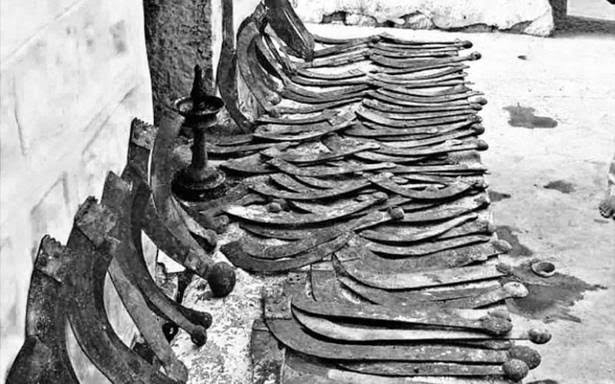Chatrapati Shivaji : The Great Maratha Warrior
Chatrapati Shivaji Maharaj, also known as Shivaji Bhonsle, was a towering figure in Indian history, renowned for his military prowess, strategic acumen, administrative skills, and devotion to his people. Born on February 19, 1630, in the hill-fort of Shivneri, located near Pune in Maharashtra, Shivaji Maharaj emerged as a formidable leader who established the Maratha Empire and laid the foundation for a sovereign Hindu state.
Shivaji Maharaj was born to Shahaji Bhonsle, a prominent Maratha general, and Jijabai, a devout Hindu woman known for her strength and piety. His upbringing was heavily influenced by his mother's teachings, which instilled in him a deep sense of duty towards his people and his religion. Under her guidance, Shivaji imbibed the values of courage, righteousness, and compassion, which would shape his character and define his reign.
Despite being born into a noble family, Shivaji's childhood was fraught with challenges. His father, Shahaji, served various Deccan Sultanates, leading to frequent changes in their allegiances and territories. As a result, Shivaji grew up witnessing the injustices inflicted upon the Hindu population by the oppressive Mughal and Deccan Sultanates, which fueled his desire for independence and sovereignty.
Shivaji's education was diverse, encompassing military training, political affairs, and religious teachings. He received instruction in swordsmanship, horse riding, and guerrilla warfare from skilled tutors, honing his martial skills from a young age. Additionally, he familiarized himself with the art of governance and diplomacy, laying the groundwork for his future endeavors as a statesman and leader.
Shivaji Maharaj's ascent to power began in the late 1640s when he started asserting his authority over the territories controlled by the Adil Shahi and Bijapur Sultanates. His first significant conquest was the capture of the Torna Fort in 1646, marking the beginning of his campaign to establish an independent Maratha kingdom. Over the next decade, Shivaji embarked on a series of daring raids and military expeditions, gradually expanding his influence and consolidating his power base.
One of Shivaji's most audacious acts was the capture of the impregnable fortress of Raigad in 1656, which served as his capital and stronghold for the remainder of his life. From Raigad, Shivaji launched further campaigns to liberate Maratha territories from the yoke of foreign rule, inspiring widespread support and admiration among the local populace.
Shivaji Maharaj was a master tactician who employed innovative military strategies to outmaneuver his adversaries and achieve his objectives. Recognizing the superior strength and resources of the Mughal and Deccan Sultanates, Shivaji adopted a strategy of guerrilla warfare and asymmetric tactics, utilizing his intimate knowledge of the terrain to his advantage.
One of Shivaji's most celebrated victories came in 1664 when he executed a daring raid on the Mughal port of Surat, crippling the Mughal economy and asserting his dominance over the western coast. This audacious feat not only showcased Shivaji's military prowess but also demonstrated his ability to strike fear into the hearts of his enemies.
Shivaji Maharaj's military campaigns were not just about conquest; they were also about liberation and justice. He championed the cause of the common man, protecting villages from plunder and oppression, and establishing a system of governance that prioritized the welfare of his subjects. Under his rule, the Maratha Empire flourished, attracting skilled administrators, traders, and artisans from across the Indian subcontinent.
The legacy of Chatrapati Shivaji Maharaj is indelibly etched in the annals of Indian history, inspiring generations of freedom fighters, nationalists, and social reformers. His vision of a united and sovereign India, free from foreign domination, continues to resonate with millions of people across the country.
Shivaji's contributions extend beyond the realm of politics and warfare; he was also a patron of art, culture, and literature. His court was adorned with scholars, poets, and musicians, who celebrated his reign through their creative expressions. Shivaji's emphasis on cultural revivalism and Hindu identity laid the foundation for the Maratha resurgence and the broader Hindu renaissance that followed.
In addition to his military and political achievements, Shivaji Maharaj's legacy is also defined by his commitment to social justice and religious tolerance. Despite being a devout Hindu, Shivaji respected the beliefs and practices of other faiths, fostering harmony and coexistence among people of diverse backgrounds. His administration was characterized by fairness and equality, with opportunities for advancement available to individuals regardless of caste or creed.
Conclusion:
Chatrapati Shivaji Maharaj was not just a king; he was a visionary leader, a fearless warrior, and a compassionate ruler who dedicated his life to the service of his people and his nation. His indomitable spirit, unwavering courage, and unyielding determination continue to inspire millions of Indians, reminding them of the power of perseverance and the triumph of righteousness over tyranny.
As we pay homage to this great Maratha warrior, let us strive to uphold his legacy and emulate his virtues in our own lives, ensuring that his noble ideals of freedom, justice, and unity endure for generations to come






